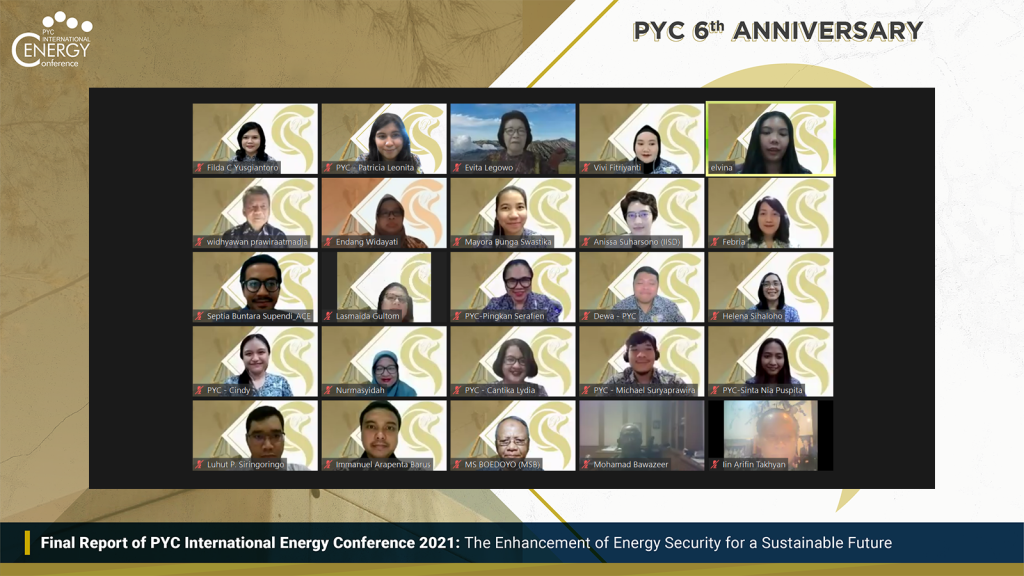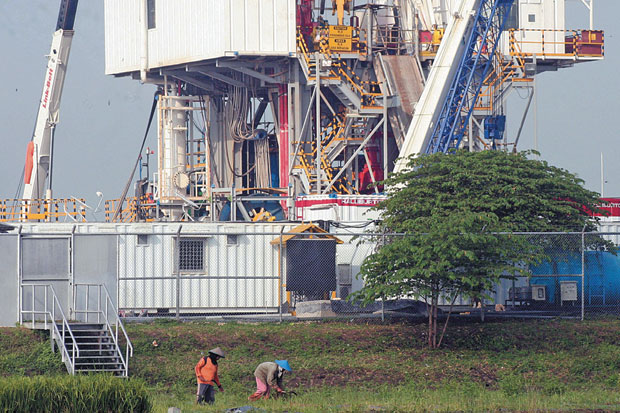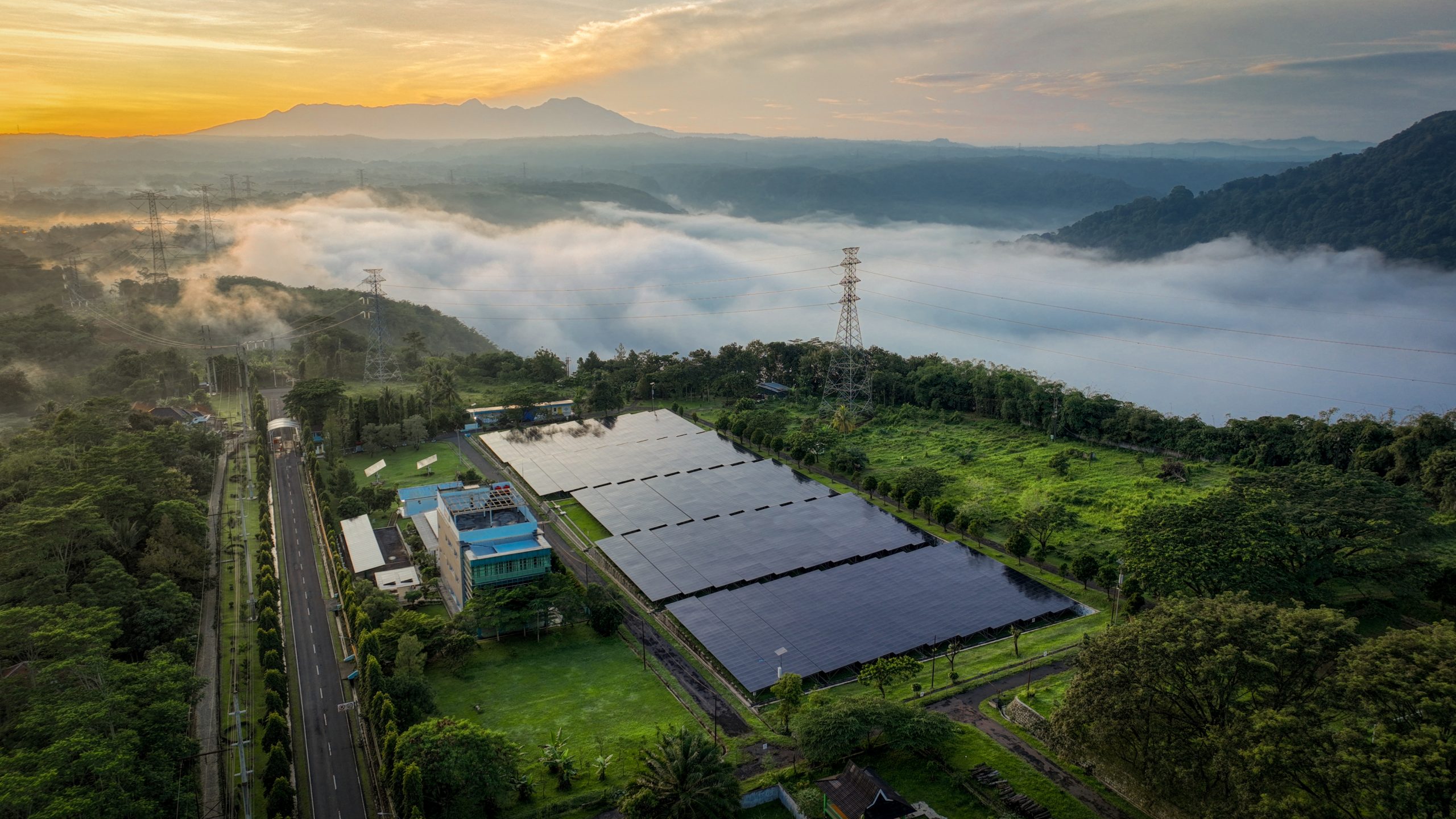Jakarta, June 16, 2022 – The Purnomo Yusgiantoro Center (PYC) held a Final Report Presentation event for the PYC International Energy Conference 2021, titled “The Enhancement of Energy Security for a Sustainable Future,” coinciding with PYC’s 6th anniversary. The event was held virtually and opened by Filda C. Yusgiantoro, Chairperson of PYC. Key attendees included PYC Founder Prof. Purnomo Yusgiantoro, Septia Buntara Supendi, Manager of the Renewable Energy and Energy Efficiency Department at the ASEAN Centre for Energy, Widhyawan Prawiraatmadja, lecturer at the School of Business and Management, Bandung Institute of Technology, and Anissa Suharsono, Energy Policy Associate at the International Institute for Sustainable Development.
In her remarks, Filda explained that the main purpose of the event was the launch of the report from the International Energy Conference (IEC), held in October 2021. The IEC report had previously been reviewed by experts such as Dr. Widhyawan Prawiraatmadja (ITB), Dr. Pri Agung Rakhmanto (Reforminer Institute), Anissa Suharsono, B.Sc, M.Sc (International Institute for Sustainable Development), Luky A. Yusgiantoro, B.Sc, M.Sc, Ph.D. (PYC), Inka B. Yusgiantoro, B.S.E, M.Sc, M.S.E, M.A, Ph.D. (PYC), and Filda C. Yusgiantoro, S.T, M.B.M, M.B.A, Ph.D. (PYC).
Filda added: “I hope that the results of the International Energy Conference 2021 report will provide insights for all stakeholders on future energy issues. On its 6th anniversary, PYC remains committed to contributing time and resources to the nation as a non-profit organization. This success is a result of collaboration among various stakeholders, particularly the internal PYC team.”
Septia Buntara Supendi, in his presentation, stated that “Energy security can be categorized into two main groups: Resource Security and Power Security. These issues must be addressed collectively by multiple stakeholders.” He emphasized that the key to enhancing energy security is strengthening collaboration among ASEAN member states and enriching knowledge of renewable energy (RE) through research and development. These strategies are expected to boost Indonesia’s capacity, as a country with significant influence on Southeast Asia’s energy mix, to incorporate more RE sources into its energy portfolio.
The International Energy Conference 2021 report was presented by I Dewa Made Raditya Margenta, a PYC researcher. In his presentation, Dewa highlighted the importance of fossil energy, electricity, and RE development in the energy transition, achieving Net Zero Emission (NZE) scenarios, and strengthening national energy security. PYC’s approach follows the “4A” framework: Availability, Accessibility, Affordability, and Acceptability. Meeting all four criteria is essential for a country to achieve energy independence.
On the other hand, achieving national energy security must align with government programs, including climate crisis mitigation. In general, the strategy for optimizing the development and use of RE focuses on three aspects: Technology, Policy, and Financing. Consistent with the ASEAN Centre for Energy (ACE), collaboration between the government, industry, businesses, society, academia, and non-profit organizations is key to successful energy transition efforts.
Widhyawan Prawiraatmadja, in his response, noted that global energy disruptions have already occurred and are significantly affecting the energy transition. He emphasized that several strategies and policies should be directed toward addressing the challenges of decarbonization. Widhyawan outlined a few key strategies for the energy sector, including focusing on decarbonizing the energy sector, enforcing a coal moratorium, and increasing renewable energy sources. In the transportation sector, he advocated for a shift to mass transit and greater use of biofuels and electric vehicles (EVs). In the industrial sector, coal should be replaced by gas and biomass, accompanied by electricity efficiency measures.
Anissa Suharsono emphasized that the bottleneck in the energy transition lies in the policy sector. Current policies are deemed insufficient to create a conducive environment for long-term renewable energy investment. This situation results in global dependence on fossil fuels during energy disruptions. Coupled with the issue of affordability, she questioned whether subsidizing fossil fuels for the public during energy disruptions is the right strategy. In many cases, subsidies are misallocated and do not significantly impact energy affordability for the public. Anissa agreed with Widhyawan that the strategy should involve gradually reducing coal use and fossil fuel subsidies, while establishing a clear roadmap for future energy transition plans.
In her closing remarks, Filda reiterated the importance of the “4A” approach and the development of the energy sector with a focus on transitioning to cleaner, more environmentally friendly energy. Amid the accelerating energy transition, the fossil energy sector can still contribute to energy security and sustainability by diversifying its business portfolio through RE development, integrating with the petrochemical industry, and prioritizing environmental, social, and governance (ESG) principles. Additionally, diversifying power generation is key to achieving NZE targets.








